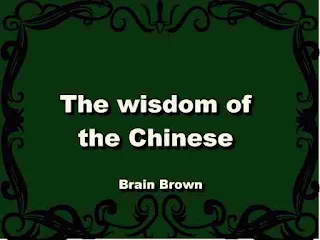The wisdom of the Chinese: their philosophy in sayings and proverbs
In the Western world someone has said: * Confucius invented wisdom," and when you find sayings of his like this one — "When you know a thing, to hold that you know it, and when you do not, to admit the fact, — this is knowledge," you are willing to allow him the title. Confucius and his greatest follower Mencius were reformers in the true sense of the word. Their whole aim was to construct personal character, and they demanded that the moral and spiritual nature should be substituted for the might of the strong. No rank was too high, no class too humble, to be taught this universal principle; and with no other personal authority than their own honest conviction, these men went forth to the demand of kings and peoples the square acceptance of its claims.
When Confucius was thirty-three years of age he visited Lao Tzu, who was then eighty- seven; and it is recorded that the great founder of Taoism was not much impressed by the younger man.
Lao Tzu was a mystic; his Wu Wei means "do nothing," the supposed meaning of which is: get in harmony with the great Spirit of things and you will be unconsciously impelled to right action — in other words, do nothing with a self- will. Confucius, on the other hand, was a practical man, a teacher of ethics, who thought by self-conscious direction one could arrive at proper action. To Lao Tzu, Confucius seemed a materialist, so it is not strange that the young man did not impress the older one.
Both these great men, though they differ in method, are the substance of the Chinese consciousness, the race mold or type; they have left their mark upon their people. They were illumined men, lighted with the spirit to see and do right. They had the power to make clear the path for others; they went about introducing the noble thoughts that lead to the higher life, and they inspired true confidence by practicing what they preached. Both sages inspired great followers; the great exponent of Confucius was Mencius, who proved
himself worthy of his master; the great exponent of the doctrines of Lao Tzu was Chuang Tzu^ himself a mystic, and by nature fitted for the interpretation of the mystical teachings of the Tao which could be translated as " Way,' — meaning the spiritual "Way'* or path trodden by those having close contact with nature. Lao Tzu said: *' Go back to Mother Nature, for lying on her bosom, you will be guided on the proper way."
Contents:
Preface. 7
Introduction 11
Confucius: Analects 21
Confucius: The Doctrine Of The Mean, 39
Confucius: Great Learning 6 1
Mencius: The Real Man 6j
Lao Tzu: Tao-teh-king 85
Lao Tzu: Wu-wei Loi
Lao Tzu: Precepts And Sayings Ill
Chuang Tzu 1 23
Yang Chu 137
Kang-hsl's Sacred Edict 1 45
Kuan-yi-wu; Yu Tse; Tse-chan 1 49
The Poetry Of The Chinese 1 55
Proverbs And Maxims I7i
Moral Maxims 1 83
Bibliography And Sources 207
- Author: Brain Brown
- Publication date:1920

